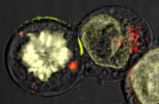(Press-News.org) Fluctuations of serotonin levels in the brain, which often occur when someone hasn't eaten or is stressed, affects brain regions that enable people to regulate anger, new research from the University of Cambridge has shown.
Although reduced serotonin levels have previously been implicated in aggression, this is the first study which has shown how this chemical helps regulate behaviour in the brain as well as why some individuals may be more prone to aggression. The research findings were published today, 15 September, in the journal Biological Psychiatry.
For the study, healthy volunteers' serotonin levels were altered by manipulating their diet. On the serotonin depletion day, they were given a mixture of amino acids that lacked tryptophan, the building block for serotonin. On the placebo day, they were given the same mixture but with a normal amount of tryptophan.
The researchers then scanned the volunteers' brains using functional magnetic resonance imaging (fMRI) as they viewed faces with angry, sad, and neutral expressions. Using the fMRI, they were able to measure how different brain regions reacted and communicated with one another when the volunteers viewed angry faces, as opposed to sad or neutral faces.
The research revealed that low brain serotonin made communications between specific brain regions of the emotional limbic system of the brain (a structure called the amygdala) and the frontal lobes weaker compared to those present under normal levels of serotonin. The findings suggest that when serotonin levels are low, it may be more difficult for the prefrontal cortex to control emotional responses to anger that are generated within the amygdala.
Using a personality questionnaire, they also determined which individuals have a natural tendency to behave aggressively. In these individuals, the communications between the amygdala and the prefrontal cortex was even weaker following serotonin depletion. 'Weak' communications means that it is more difficult for the prefrontal cortex to control the feelings of anger that are generated within the amygdala when the levels of serotonin are low. As a result, those individuals who might be predisposed to aggression were the most sensitive to changes in serotonin depletion.
Dr Molly Crockett, co-first author who worked on the research while a PhD student at Cambridge's Behavioural and Clinical Neuroscience Institute (and currently based at the University of Zurich) said: "We've known for decades that serotonin plays a key role in aggression, but it's only very recently that we've had the technology to look into the brain and examine just how serotonin helps us regulate our emotional impulses. By combining a long tradition in behavioral research with new technology, we were finally able to uncover a mechanism for how serotonin might influence aggression."
Dr Luca Passamonti, co-first author who worked on the research while a visiting scientist at the Cognition and Brain Sciences Unit of the Medical Research Council in Cambridge (and currently based at the Consiglio Nazionale delle Ricerche (CNR), Unità di Ricerca Neuroimmagini, Catanzaro), said: "Although these results came from healthy volunteers, they are also relevant for a broad range of psychiatric disorders in which violence is a common problem. For example, these results may help to explain the brain mechanisms of a psychiatric disorder known as intermittent explosive disorder (IED). Individuals with IED typically show intense, extreme and uncontrollable outbursts of violence which may be triggered by cues of provocation such as a facial expression of anger.
"We are hopeful that our research will lead to improved diagnostics as well as better treatments for this and other conditions."
###
For additional information please contact:
Genevieve Maul, Office of Communications, University of Cambridge
Tel: direct, +44 (0) 1223 765542, +44 (0) 1223 332300
Mob: +44 (0) 7774 017464
Email: Genevieve.maul@admin.cam.ac.uk
Notes to editors:
1. The paper 'Effects of Acute Tryptophan Depletion on Prefrontal-Amygdala Connectivity While Viewing Facial Signals of Aggression' was published online on 14 September in Biological Psychiatry.
2. Funders: This study was supported by the James S. McDonnell Foundation
21st Century Collaborative Award/Bridging Brain, Mind and Behavior (Award No. 22002015501) to E. A. Phelps and T. W. Robbins and completed within the Behavioural and Clinical Neuroscience Institute, which is cofunded by the Medical Research Council and the Wellcome Trust. Dr. Passamonti was funded by the Betty Behrens Research Fellowship at the Clare Hall College of the University of Cambridge. The J. S. McDonnell Foundation Network grant supported Dr. Apergis-Schoute. Dr. Crockett was supported by the National Science Foundation.
Dr. Rowe was supported by the Wellcome Trust (Grant No. WT 088324); Dr. Calder by the Medical Research Council (Project Code MC_US_A060_0017). Development of the MacBrain Face Stimulus Set (NimStim) was overseen byNimTottenham and supported by the John D. and Catherine T. MacArthur Foundation Research Network on Early Experience and Brain Development.
END
LOS ANGELES (Sept. 15, 2011) – Treatment with a telaprevir-based combination regimen for hepatitis C – heretofore a chronic, destructive and difficult to manage disease – effectively can be shortened to six months in about two-thirds of patients, finds a new study published Thursday in the New England Journal of Medicine.
Telaprevir, a drug approved for use against hepatitis C in May, inhibits replication of virus. This anti-viral drug and a similar medication called boceprevir have nearly doubled the number of patients with sustained response. Among patients treated ...
Sabal Financial Group, L.P., formerly Milestone Asset Resolution Company, LLC, a diversified financial services management firm, announces the recent acquisition of a $158 million portfolio of performing and non-performing commercial real estate loans and commercial acquisition, development and construction loans and credit facilities. The acquisition represents the first sale transaction under the FDIC's pilot Small Investor Program ("SIP") and represents the commercial loan component of a larger $297 million loan sale mandated by the FDIC for the assets of failed ...
Small group homes for people with dementia provide good quality care and a domestic environment where people can live as individuals and families can get involved. But tension can arise when it comes to deciding who takes responsibilities for certain practical and caring tasks.
Those are the key findings of a study of two group living care homes in the Netherlands, published in the September issue of the Journal of Clinical Nursing.
"It's estimated that 80 million people worldwide will suffer from dementia by 2040" says Ezra van Zadelhoff from Maastricht University. ...
At least one of the "Big Three" credit ratings agencies exaggerated credit scores of private debt compared to public bonds during the last 30 years, according to a new study by researchers from Rice University, American University and Indiana University.
The recent downgrade of U.S. debt by Standard & Poor's makes the study timely, and the research adds to the current debate surrounding regulatory reliance on credit ratings and the current Securities and Exchange Commission proposal to standardize credit ratings across asset classes.
For the study, "Credit Ratings ...
It has long been known that roots alter the soil in their immediate vicinity, where other microorganisms live and the chemical composition is altered compared to that further away from the roots. An international research team has now demonstrated in experiments at the Paul Scherrer Institute that the soil in the vicinity of roots also contains more water – contrary to the earlier belief that there must be less water in this region, as the plant takes up water from the soil. Apparently, however, plants create a small water reserve that helps to tide them over through short ...
Tuesday, September 13, 2011, Cleveland: Researchers at Cleveland Clinic have discovered that cardiac patients receiving medicated stents – a procedure that occurs often when blood vessels are blocked – have a lower likelihood of suffering heart attacks or developing new blockages in the vessel downstream from the stent.
Stents have been used to prevent re-narrowing of coronary arteries after balloon angioplasty and newer designs have included coatings with medications to prevent re-narrowing from occurring within the stent after implantation. The recent study – led by ...
September 2011, Paris, France
The 24th ECNP Congress, which was held from 3 to 7 September 2011 in Paris, France, was once again a great success, bringing together more than 6,700 psychiatrists, neurologists, psychologists and neuroscience researchers from all over the world. ECNP is especially pleased to see an increasing number of delegates coming from outside Europe.
The annual ECNP Congress is the largest scientific meeting on mental and neurological health in Europe, promoting fruitful dialogue between neuroscientists and medical professionals. With more than ...
Scientists reveal in more detail than ever before how white blood cells kill diseased tissue using deadly granules, in research published today in PLoS Biology.
The researchers, from Imperial College London and the University of Oxford, used 'optical' laser tweezers and a super-resolution microscope to see the inner workings of white blood cells at the highest resolution ever. The researchers describe how a white blood cell rearranges its scaffolding of actin proteins on the inside of its membrane, to create a hole through which it delivers deadly enzyme-filled granules ...
Are children as young as five years old so driven by consumerism and fashion that they are in danger of 'losing' their childhood?
Not necessarily, according to Dr Jane Pilcher, a sociologist at the University of Leicester, whose research findings on children and fashion were recently reported in the international journal, Childhood.
Nonetheless, her findings showed that brands and logos are highly important to some children, influenced by family attitudes, peer pressure and celebrity culture.
The desire for certain brands and logos, especially in boys' sportswear, ...
Martha Stokes C.M.T. will be speaking at the AAII Puget Sound Chapter in Mercer Island, WA!
Saturday, September 24, 2011 from 9:00 AM - 12:00 PM.
Registration/Social at 8:30 AM.
The topic will be New Technology Cycle Investing Opportunities.
Attend this meeting and learn:
- Which sectors and industries could experience exponential growth
- Methods for separating the most competitive companies from those that are losing momentum
- The reasons why certain new industries are growing exponentially
For more information please visit:
http://sites.google.com/site/pugetsoundchapter/home
http://technitrader.com/get-connected/
Contact ...

